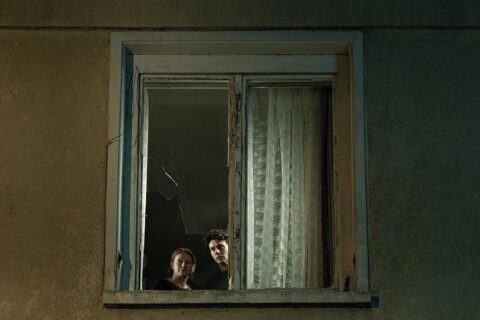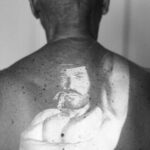Many people remain reluctant to revisit the COVID pandemic on screen, still craving escape from a recent trauma that affected lives in vastly different ways — some endured loss or illness, others found new hobbies or unexpected solace in lockdown; many simply want to forget it ever happened. Stephan Komandarev’s fourth feature, Made in EU (2025), challenges that hesitation to look away and brings us back to the early stages of the outbreak, telling the story of a woman facing a local witch hunt after testing positive.
In a small Bulgarian town, far from the hustle and bustle of Sofia, Iva (Gergana Pletnyova), a middle-aged widow, endures long, gruelling shifts at an Italian-owned garment factory. Sick leave is practically nonexistent, and the factory thrives on pushing workers to their limits, disregarding basic safety in favour of relentless overtime. When Iva finally asks the company doctor for time off, she’s dismissed with paracetamol and ordered back to the sewing machine, unknowingly hiding her worsening symptoms. She eventually tests positive for COVID and is branded “patient zero” by the media, turning her into a scapegoat for the outbreak spreading through the factory and community.
The film treats the pandemic as no mere backdrop but a pressure point that exposes entrenched social fault lines and the ongoing exploitation of labour under EU capitalism. While occasionally didactic and shaped by narrative turns that feel overly familiar and easy to predict, Made in EU still delivers a rather nasty indictment of how quickly solidarity in small towns can fall apart when economic strain and political tension start building. People get scared, turn on each other, and look for someone to blame — making it clear how easily fear and desperation can be used to keep existing power structures in place.
This dynamic is felt in the way those closest to Iva turn against her — including her son, Misho (Todor Kotsev), whose own positive test abruptly derails his plans to emigrate to Germany with his girlfriend. Pletnyova makes the most of a role that mostly casts her as a silent martyr, a kind of emotional whipping post for the fears and failures of those around her. Her performance is one of restraint and control; much of her screen time is spent absorbing humiliation and suspicion, yet the script gives her so few opportunities to push back, she starts to feel like a blank character. At times, Iva comes off as more symbolic than fully realised, and the film might have landed harder had she been allowed more unpredictability or contradiction. Kotsev, as her resentful son, is given more to do here — his frustration gradually gives way to a deeper awareness as the town’s collective paranoia and violent impulses reveal something far more corrosive than a virus.
We’ve heard this story before — The Scarlet Letter (Nathaniel Hawthorne, 1850), The Crucible (Arthur Miller, 1953), and countless other parables about communities turning on the individual. Made in EU knowingly steps into that tradition. Its emotional rhythms are familiar, and it doesn’t entirely escape the classic “individual versus the system” or “the mob turns inward” structure. But it delivers its critique with a clear, deliberate urgency. What sets it apart is its context: post-socialist Bulgaria, still treated by much of the European Union as peripheral, its working class caught in a system too fragile to fight back. The film isn’t flawless, and its sharpest provocations sometimes go undeveloped. Still, a work so openly aligned with labour — and one bold enough to include a line like “Turns out everything they said about communism was a lie, and everything they said about capitalism was true” — demands to be taken seriously.
Earl lives in Baltimore, Maryland




